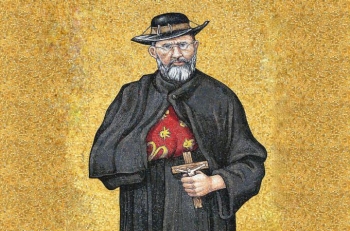
.jpg) F. M. Britto
F. M. Britto
.jpg)
Serving the leprosy patients, this priest too contracted that deadly virus. Though he too then became an outcaste, today his bronze figure stands tall in Statuary Hall at the US Capitol.
Father Damien was born as Joseph De Veuster on Jan 3, 1840 in the village of Tremelo in Belgium as the youngest of seven children to corn merchant John Francis De Veuster and Anne Catherine Wouters. The 13 years old Damien was forced to quit school to work in the family farm.
Joining in a missionary religious congregation, he took the name Damien. Since his brother-priest could not travel to Hawaii (US) due to sickness, Damien took his place.
Since leprosy was then highly contagious and incurable, Hawaiian King Kamehameha V ordered in 1865 the most serious cases to be moved to a settlement colony of Kalawao on the island of Molokai. Since the king could not provide the quarantined people food and other supplies, the lepers had to care for themselves by growing crops, which became impractical for them.
Bishop Louis Desire Maigret of Honolulu felt the need to send priests to assist these lepers. Since it involved high risks, he asked for volunteers. Four priests, including Father Damien volunteered. The bishop asked them to take turns. On May 10, 1873, the first volunteer, Fr Damien arrived at the settlement at Kalaupapa, where some 600 lepers lived. On arrival, the bishop introduced Fr Damien to the lepers as, “one who will be a father to you, and who loves you so much that he does not hesitate to become one of you; to live and die with you.”
With his compassion, Fr Damien provided them spiritual, emotional and material comfort. He dressed their ulcers, made coffins and dug graves. He ate food with them by hand, shared pipes and lived with the lepers as equals. He comforted the dying and prayed at their graves. He addressed his flock, “We lepers”.
Due to the request of him and the lepers, the superiors allowed him to stay there. Fr Damien built a church, a school, and two orphanages. Creating leaders among them to serve them, he constructed chapels, houses, hospitals, roads, built a reservoir and organized farms.
After 11 years, Fr Damien too contracted leprosy. After serving them for 16 years, the 49 years old Fr Damien died of leprosy on April 15, 1889.
As per his wish, he was laid to rest under the same pandanus tree, where he first slept upon his arrival in Molokai. But King Leopold III of Belgium buried his body in Leuven, close to his village. Pope Benedict XVI canonised him on Oct 11, 2009.
Mahatma Gandhi remarked that Fr Damien’s work had inspired his social campaigns in India. He added, “The Catholic Church counts by the thousands those who after the example of Father Damien have devoted themselves to the victims of leprosy. It is worthwhile to look for the source of such heroism.”